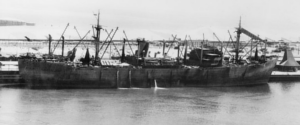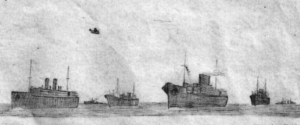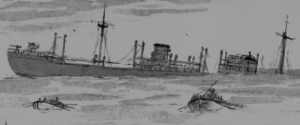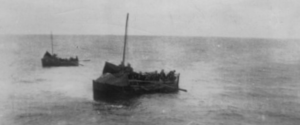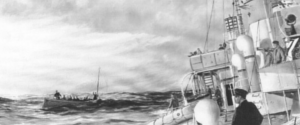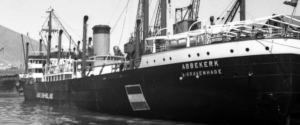
At night the Germans came back and had no trouble finding the docks again. The whole dock area was in flames and they just dropped their bombs into the middle of this. The situation on board was such that with the engine room out of order we could not stay on board. No water, no power, no food, no nothing. The result was that the officers were billeted in the ‘Bonnington Hotel’ in London, a fairly large hotel. We soon found out that it sold no alcoholic beverages. Luckily there was a well-stocked Pub only a two minute’s walk away.
All this aside, life and work went on and we soon had a roster worked out. Because one of our engineers had been placed on another ship some time before there were now only two of us. As we had absolutely no say in these matters it was quickly decided that both of us were placed in the night watch on a turn about basis. During the day everybody worked and at night the two of us were alone on the ship. Was this dangerous? Well-only during the bombardments.
It was argued that, if during a bombardment any incendiary bombs fell on the ship we could extinguish these with a couple of shovels of sand. For this purpose we placed a number of buckets of sand along the deck. Very fast action was required, particularly if a bomb had fallen on one of the timber hatches. In a very short time the bomb would burn through the wood and fall down into the hold burning. If that happened you really were in trouble. I do not want to talk about what really happened with these falling bombs.
Was all this justified? We were both 21 years old and were responsible for the safety of a large and helpless ship with a value of millions. Everything was pitch-dark because of the blackout. Today we would say ‘no’, but then everybody was in the same boat and let’s be honest, we did not know any different and we did what we were ordered to do. The first couple of weeks we were very uncomfortable with this responsibility, but that feeling went more quickly than you would have thought.
What happened to our ship now that it could sink no lower? They put pumps on deck that could pump more water out than was coming in. The ship started to float and that allowed them to quickly tow the ship to a dry-dock and pump it dry. I went down into the engine room and what I saw was indescribable, but I will try. Below floor level were the bilges where all the oil and rubbish congregate that is regularly pumped out to sea. This oil had come up with the water but when the water was pumped out the oil had draped a fine black layer of oil over every square millimetre. The normally spick and span white walls and the light grey equipment was now a dirty black. Looking at this for the first time one could only exclaim ‘bloody hell’.
We were in the dry dock, the keelson on its blocks and at the height of the main deck on the outside were beams against the wall of the dock keeping the ship upright. We did not know, but the ship would remain in this position for seven and a half months.The Germans bombarded mainly during the day and attacked larger London. Because of this we were not kept busy during our allocated night watches. We just had to get used to the rhythm of the watches and the bus ride with the double decker bus to the East-End docks and back.What we could not get used to was the food in the Hotel. It was simplynot enough. After dinner most people went to a delicatessen along the street to buy some sandwiches. We complained to the head of our table, the second mate, who immediately took action. He asked the Hotel manager, very discreetly, to increase the size of the portions of food. This happened and so both parties lived together in full satisfaction for the time being. he losses in the air were getting bigger and bigger on both sides.
The Germans lost more planes than the English. The losses were larger than the rate of replacements coming through. The Germans first changed their tactics and started to conduct bombardments at night. This lasted about three months and caused a lot of damage to London as well as many victims. The docks were not forgotten either, the droning of aircraft engines and the screaming of bombs were not particularly reassuring. The incendiary or fire bombs were raining down. Luckily only once two bombs fell on the ship which I, with much bravado, or maybe it was stark fear, or a bit of both, could render safe. We must take into consideration that whenever it was the dock’s turn I would swig half a flask of whisky beforehand. You’d be surprised how brave you can be even if you are no hero. These bombardments lasted till the beginning of January1941; after that things got a little quieter.
While we did not work in the engine room any more it did not mean that nothing was happening there. The unbelievable damage to the ship was slowly but surely being repaired. Our night watches had not changed, only the bus ride became more hectic because ever so often the streets were blocked with rubble or there was a large bomb crater in the street. We used our free time to explore the inner city. A film, a theatre, a cup of tea in a Lyons corner house, at night mostly in Peter’s bar about fifty paces from the Hotel. That was a really cosy pub where at the beginning of the war you could order a steak that was grilled over the open fire. That is where I came to talk to a guy who told me that if Hitler would know where he lived and write his name and address on a bomb this bomb would never hit him. ‘And do you know why?’ he asked . Of course I did not know. He took another swig and laughingly cried out: ‘Because I will be in this bloody pub Ha, Ha, ha!’
For him it was high time the pub closed. The pubs always closed at eleven o’clock after the boss of the outfit had called out ‘Time ladies and gentleman, Time please!’ Nobody ever complained. It was really a good time to go to bed because after all there was nothing going on outside anyway. In the streets (barring areas where the fires were burning) it was pitch dark and often there were aircraft in the sky. We had to wear helmets because there was often shrapnel from the anti aircraft guns falling about.
This was life from day to day. But in any case one was alive.
<< previous chapter ——————————————————————–next chapter >>

